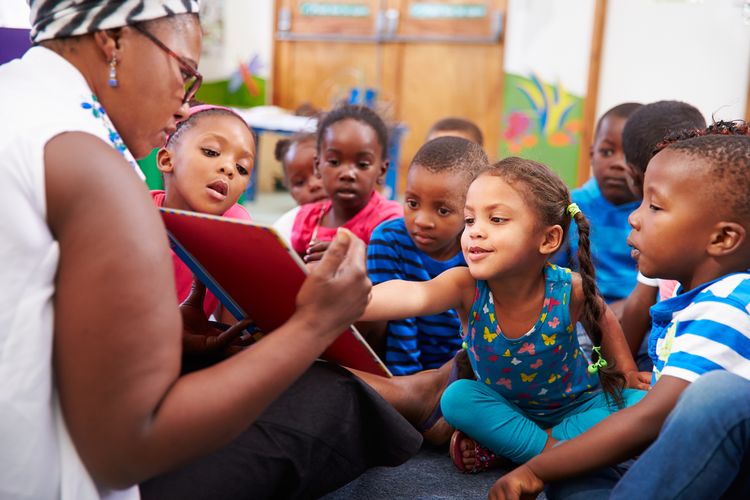Pandemic babies with developmental delays can be helped to make up for lost social interaction – 5 tips for parents

Ariel Skelley / Getty Images
Abigail A. Allen, Clemson University
Typically, about 1 in 6 children experience a developmental delay. But children born during the pandemic, a 2022 study has found, have nearly twice the risk of developmental delays in communication and social development compared to babies born prior to the pandemic.
The reason, some researchers believe, is related to less interaction with other children, among other factors.
Delays in communication can mean a child learns to talk later, talks less or uses gestures like pointing instead of talking. Social developmental delays might be present when a child doesn’t respond to their name when called, doesn’t look at what adults are paying attention to in the environment, or doesn’t play with other children or with trusted adults.
It’s hard to say if children who suffer from these delays can be caught up or if they will require continued services or special education into elementary school and beyond. The more severe the delay, the more likely the child will need ongoing specialized services.
One way to be more certain is to talk to your child’s pediatrician about whether your child is meeting certain developmental benchmarks. The Centers for Disease Control and Prevention, part of the U.S. Department of Health and Human Services, also recommends that parents contact their state’s early intervention program and say, “I have concerns about my child’s development, and I would like to have my child evaluated to find out if he/she is eligible for early intervention services.”
In the meantime, parents and early childhood teachers can support language development for children who may suffer from delays by providing rich, responsive interactions and conversations.
As a researcher who specializes in language and literacy skills for young children with learning disabilities, here I offer five evidence-based strategies that parents and teachers of children with pandemic-related developmental delays can use to support the growth of their child’s language skills and later school performance.
1. Get children talking
Language is how we share experiences. However, children with developmental delays may not talk very much. Adults can create opportunities to talk, which helps children develop the ability to communicate and interact with others.
One way to do this is to create situations in which the child has to talk to get something they want. For example, at home, put a favorite toy or snack in a clear sealed bag or plastic container so the child can see the item but cannot get it themselves without asking for help. At preschool or day care during snack time or free play, provide the student with two choices and have them say which choice they want. For children whose speech is hard to understand, any noise or attempt at talking is a good sign. The important part is that they are trying to talk, not that the words come out perfectly. If the child’s speech is unintelligible, have them point and talk at the same time to show their choice.
2. Expand on children’s speech
Providing rich language is critical for supporting the language development of children with developmental delays.
One way to provide rich language is by responding to what the child says and then adding on details or adjectives. For example, if a young child sees a dog and exclaims, “Doggy!”, an adult could expand on that speech by saying, “Yes! There’s a big brown dog.” The adult is acknowledging what the child said and providing more language for the child to hear and respond to while sharing the experience of seeing a dog.
3. Be a warm and attentive conversation partner
When adults provide warm, supportive interactions, children go on to have better language skills in preschool, better vocabulary and reading ability in first grade, and better mathematics performance in third grade.
Being a supportive partner means following the child’s lead and not always telling the child what to do. For example, play with toys the child chose or enact pretend scenarios the child came up with. During conversation, talk directly to the child about a topic the child chose and take turns talking. Don’t worry about correcting the child or guiding the interaction. It’s OK if you’ve talked about the dog across the street a thousand times. Each interaction builds language skills. Stay positive and engaged.
4. Share a book
Shared book reading is a technique where the adult actively involves the child in the storytelling experience. Children who participate in frequent shared book reading have larger vocabularies, use more complex language and have better reading comprehension in later grades.
Start by asking open-ended questions like, “What do you think will happen next?” Talk to the child about their real-life experiences similar to the book, like, “Remember when we went to the park? What did we do there?”
Point out words and letters while reading aloud to help children develop their awareness of print. Talk about interesting words in the story and define new words. Children often like to read the same book over and over, so there will be many opportunities to use these strategies during story time. Don’t worry about using them all at once.
5. Talk about words
Help children develop a better awareness of the connection between words and how they sound. This is an important skill that supports reading and writing.
Clap or count syllables in words, such as “cupcake” or “butterfly.” Tell nursery rhymes and have the child say which words rhyme or come up with other words that rhyme. Talk about the sounds you hear at the beginning or end of words, such as the “t” sound in “tiger” or the “m” in “room.” Children are slowly learning that spoken language is made up of words and sounds that can be represented by written letters. This knowledge is the gateway for learning to read and write.
Abigail A. Allen, Associate Professor of Special Education, Clemson University
This article is republished from The Conversation under a Creative Commons license. Read the original article.















